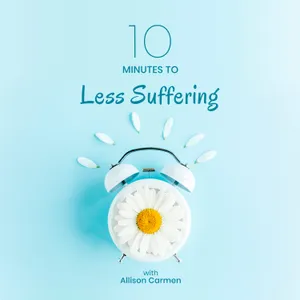Podcast Summary
Igniting Positive Relationships To Combat Burnout At Work: Positive relationships at work are essential to remain productive and healthy.
At work, we need to trust each other and build relationships if we want to be successful.We should not neglect people or be negligent at work, because it makes things harder.A recent study showed that 57% of people who are burnt out are less productive and 47% produce lower quality work.The amount of people feeling burnt out is increasing year by year.If you are feeling stressed, burned out, or pressured at work, it's important to take action and seek support.We can learn from each other and help each other navigate difficult times at work so that we can be successful and healthy.
Unlocking Eudonic Happiness Through Skill-Building at Work: Learning new skills and growing at work can bring us happiness and reduce stress.
We spend a lot of our time working, and it can be a source of stress in our lives.Achieving goals and feeling validated at work can lead to wellbeing.Stress can't be avoided by just trying to run away from work.To reduce work related stress, we need to look at the work we have and ask ourselves what skills we don't have yet that would make work easier.Eudonic happiness is the joy we feel when we reach our potential.Learning new skills and growing at work can bring us happiness and reduce stress.
Unlocking Your Team-Building Potential to Achieve Fulfillment: Investing in learning the skill of building and leading teams can help you find ways to be fulfilled at work, reduce stress, and be more productive.
It's important to remember that building and leading teams is a skill and can be learnt.Investing in learning this skill can reduce stress and help you feel more fulfilled at work.You can identify areas of weakness and work on developing specific skills to become more productive and effective at work.Achieving and completing tasks can have a positive impact on your happiness.Having a good work-life balance is important and those who have it work 21% harder than those who don't.Finding ways to be fulfilled at work can be a source of strength and satisfaction.
Achieving Meaningful Goals Through Flexibility and Autonomy: Proving productivity and effectiveness in different work environments is essential for achieving work-life balance.
Work-life balance does not mean everything must be equal; it means working hard to achieve meaningful goals.We should look at work not just as tasks, but as something that impacts our lives and other people's lives.Flexibility and autonomy are important in the workplace, but they mean different things.Flexibility means having the option to work from different places, while autonomy means having the ability to make choices about where to work.A healthy workplace needs a balance of both flexibility and autonomy, and those who are trusted and productive often receive more autonomy.It is important to prove to your boss that you are productive and effective from different places, by trying it out for a month.
Sharpening Your Saw: What Does Good Leadership and Management Look Like?: Good leadership and management involves providing resources for employees to work effectively and be productive.
It is important to be self-aware and know what works best for you in terms of productivity and creativity.Autonomy is having the choice in how we spend our time, while flexibility is knowing there is a balance between work and life.If you ask for autonomy and flexibility, be clear on how you plan to use that time.There is a story of a wood cutter who was hired to cut trees.At the beginning, he was able to cut 20 trees in the same amount of time.His productivity decreased until the manager realized the wood cutter hadn't sharpened his saw. This is an example of good leadership and management.
Can Nature Help Improve Your Performance By 20%?: Taking regular breaks, utilizing sensory deprivation, meditating and spending time in green spaces can help to reduce stress, increase creativity and improve performance.
Working hard is important, but taking a break is also essential for success.Taking time out to do something relaxing such as a bath or a chat with friends can help to reduce stress and increase your creativity.Sensory deprivation is a powerful tool to reduce stimulation and overload.Meditation in caves or other quiet places can help you to regain focus and clarity.Spending time in green spaces can help to improve performance by 20%.Natural environments replenish our brains and help us to stay alert.
Taking Regular Breaks for Optimal Productivity: Scheduling tasks and taking regular breaks can help reduce stress and improve productivity by keeping our brains focused and our bodies healthy.
It is important to take regular breaks and stretch your body for better physical and mental health.The most productive people don’t use to-do lists, but rather schedule their tasks.Sitting for longer than 20 minutes can have negative effects on your body.Standing up can help burn calories, increase blood flow and engage muscles.Our brain can only deal with up to seven things when not stressed, and three when stressed.Staying organized and having a plan is important for reducing stress and improving productivity.
Maximize Time, Energy and Relationships at Work: Allocating yourself a certain amount of time for tasks and building relationships and trust at work can help reduce stress and make it easier to get things done.
Setting up a time-boxed calendar can help you save time and energy in deciding what to do next and how long it will take.Allocate yourself a certain amount of time for each task you have to complete.Use a time-boxed calendar every Sunday to plan out your week ahead.Having a set amount of time for tasks will help you feel a sense of accomplishment.Don't neglect the relationships you have with people at work.Building relationships and trust at work can help reduce stress and make it easier to get things done.


